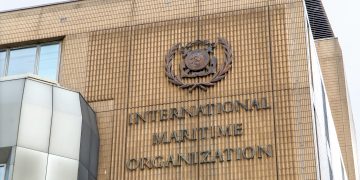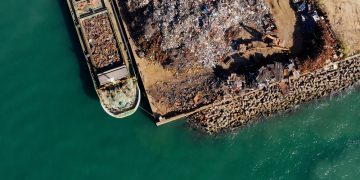Reaction and comments by ITF, SOS, Nautilus and Intermanager
 News that the UK Government has endorsed the use of armed guards on UK-flagged vessels has triggered comment from the major shipping organisations, most of which were favourable but with caveats.
News that the UK Government has endorsed the use of armed guards on UK-flagged vessels has triggered comment from the major shipping organisations, most of which were favourable but with caveats.
ITF’s general secretary David Cockroft said: “Somali-based piracy has been allowed to become so successful, savage and wide-ranging that seafarers’ and seafaring organisations’ worries about armed guards have had to be set aside. However, guards can never be anything but a supplement to the sorely-tried existing naval presence, which is now trying to cover an entire ocean.
“The ITF, like the International Shipping Federation and International Chamber of Shipping, would like to see on-vessel detachments made up of the ship’s flag state forces whenever possible.”
He continued: “Sadly no move is without risks. Pirate gangs are making fortunes out of their crimes. It is easy for them to reach for heavier and heavier weapons and turn to obscene levels of violence to counter defensive measures.
“‘We welcome David Cameron’s interest in maritime affairs, but we also have to warn him that the current defence cuts are likely to compromise the Royal Navy’s ability to fight piracy.”
ITF seafarers’ section chair Dave Heindel added: “What’s an open secret is the yawning gap in flag state responsibility. While some nations and their armed forces are doing an amazing job, others are shirking their responsibilities.”
“Until more countries are prepared to patrol, arrest and prosecute, and to take the fight to the pirates and their bases – which are often fuel dumps and facilities in plain view right on the beaches – the world will continue to be held to ransom, and innocent seafarers to risk imprisonment, torture and, ultimately, death.”
France and Spain provide so-called military vessel protection detachments, while Italy is planning a similar measure.
However, in July, Foreign Office Minister Henry Bellingham said limited resources in the light of current military commitments could not allow Royal Marines to do the same.
Under the UK Government’s plans, the Home Secretary will be given the power to license vessels to carry armed security, including automatic weapons, currently prohibited under firearms laws.
Other counter-piracy measures being taken include offering support from Treasury officials to Kenya to help its officials track down pirates’ assets.
Prime Minister David Cameron said help could be given to countries such as The Seychelles and Mauritius who were acting to bring pirates to court and imprison them.
Giles Heimann, a spokesperson for www.saveourseafrers.com said: “The shipping industry’s SOS SaveOurSeafarers campaign is right behind British PM David Cameron’s statement that the hijack and ransom by Somali pirates on ships round the Horn of Africa is a complete stain on our world.
“The cost on the world’s seafarers is huge, with hundreds held hostage on their hijacked ships for months on end, hungry and dispirited, and moreover physically and mentally tortured by their captors.
“The shipping industry organisations backing the SOS SaveOurSeafarers campaign are delighted to see decisive government action over Somali piracy. Armed guards on ships are effective in deterring pirate attacks. British-flagged ships now have the option to use armed guards if they wish to.
“However using armed guards can have important legal implications, particularly over liability, and many industry bodies believe that such a decision sits best with each individual operator based on risk analysis specific to each ship.
“The SOS SaveOurSeafarers also welcomes the British Prime Minister’s comment that he wants to make sure that more of these pirates face justice, instead of being set free in the ludicrous way they are now,” Heimann concluded.
InterManager (an active member of the Save our Seafarers (SOS) campaign) said it was delighted to hear the public vilification of piracy issued by the UK Government. The SOS campaign has strived to bring recognition of the horrific and detrimental effect of Somali piracy to both Governmental and public awareness.
Alastair Evitt, InterManager president, said that it was a quantum leap in public perception to hear the issue of piracy and merchant shipping addressed by Cameron so openly and frankly.
InterManager said that it had campaigned for the freedom of owners and managers to choose to deploy armed guards on board ships they manage.
The UK Government’s recognition of the value of armed guards and the right of the owner and manager to deploy them, in the right circumstances and in accordance with BMP4, is a great lead by the UK government and it is InterManager’s firm belief that this stance should be adopted by all flags and charterers that still do not openly support it.
The organisation re-iterated its position that it is not calling for every vessel to have armed guards on board, rather that when a detailed risk assessment deemed this the preferred option, then individual flag state legislation, or charterparty clauses should not obstruct owners and/or managers in taking this decision.
InterManager further supported the ongoing initiatives to licence the companies providing armed guards (based on qualification, competence and experience), to define the rules of engagement in the event of a pirate attack and to control the type and flow of weapons deployed both on board and while in transit to and from vessels.
Anglo-Dutch union Nautilus International cautiously welcomed the announcement.
The Union – which represents some 23,000 ship masters, officers and other shipping industry staff – agreed that the deployment of armed guards on vessels will help to further secure the safety maritime professional sailing through high risk areas, but believed that there are still ‘questions to be asked and concerns to be addressed’.
“There continue to be grave unanswered questions about liability and responsibility associated with the use of weapons on board merchant ships,” said Nautilus general secretary, Mark Dickinson.
“While it may be reassuring to see that no ships carrying security teams have been hijacked – so far, at least – there are a number of unresolved issues arising from their deployment.
“There needs to be consideration and agreement on key issues including the liabilities of masters and officers in the event of something going wrong, or the problem of flag states, coastal states and port states facilitating the carriage of weapons on board.
“The thorny of issue of the cost of providing security has the potential to give further incentives to shipowners to flag out and the quality and regulation of private armed security guards,” he concluded.
Source: Tanker Operator































































